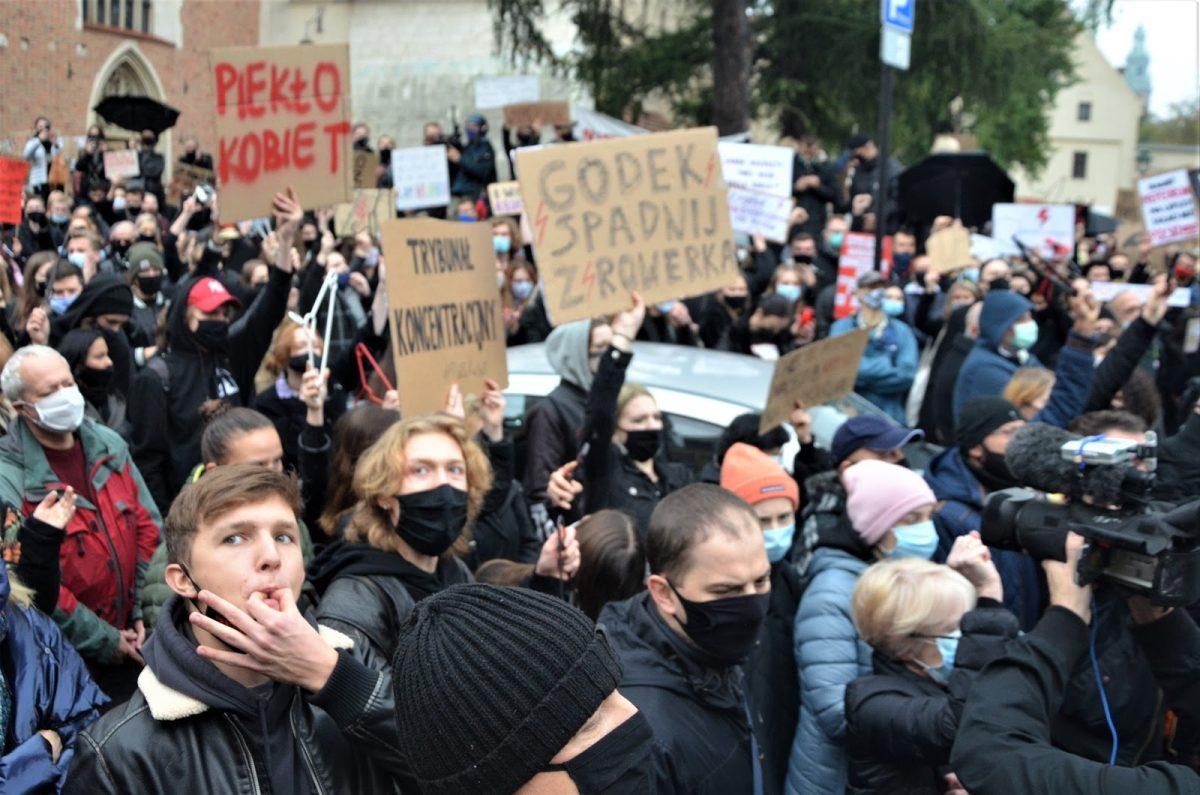In a historic decision, on October 22, the highest court of Poland ruled to ban abortions completely in the country, stating that, “The woman’s comfort is not a reason for ‘killing the unborn child.’” In a country with already strict abortion laws, this ruling made aboritions illegal even in cases of severe and irreversible fetal defects or incurable, lethal illnesses of the fetus.
In an interview with a Polish news portal Onet, Bartosz Bekier, who is the head of the extreme right group Falanga, estimated that several thousand nationalists would be attending protests, emphasizing that they were “trained in combat tactics.” Protests like the ones happening currently are the biggest seen in the country since the Solidarity movement, which led to the collapse of the Communist government in the 1980’s.
Poland is a country where 33 million of 38 million people are Roman Catholic. With that being said, the mass anger shown towards the Church has been a surprising aspect of this movement. The strong presence of the Church in every aspect of life in Poland is what has pushed the country to be more conservative, most notably in the past couple of years.
The Law and Justice (Prawo i Sprawiedliwość, PiS) party gained control of the Polish government in 2015. Pushing the image that the country needed to “rise from its knees,” they promoted hate against migrants, which had been a big issue in Europe with the displacement of refugees. Now, the party has turned its focus to anti-LGBTQ rhetoric and the rollback of women’s rights. Conservative localities have started to pass symbolic laws declaring their region free from “LGBT ideology.” President Andrzej Duda of the PiS Party, won a second term summer of 2020, even after calling LGBT rights an “ideology more dangerous than communism.”
Aside from their efforts to make abortions of any kind illegal, the conservative government’s stubborn adherance to antiquated ideas, especially when it comes to the role of women within the society, has been met with criticism from across the world.
A study, which was commissioned, though remains to be published by the government, found that 57% of Poles have experienced some sort of domestic violence at some point in their lives. Among Polish women that number rises to 63%. Researchers also found that 10% of men believe there is no such thing as rape within a marriage and that when it comes to sex, wives should always agree to what their husband wants. The growing acceptance of violence against women reached its peak in July of 2020, when the Polish justice minister, Zbigniew Ziobro, announced that he will begin the process of terminating Poland’s ratification of the Istanbul convention, which sought to prevent violence against women. The convention was ratified by the Centric Civic Platform in 2015 by the former government to try to prevent both domestic violence and violence against women. His decision was met with outrage from feminist groups within Poland, as well as from officials who had helped develop this convention.
The rise to power of the Law and Justice party is eerily similar to that of President Donald Trump. Preying off the fears of the majority, these movements have sought to bring out hate and strong nationalism within its followers. Even the campaign slogans match, with Trump supporter’s iconic red hats reading, “Make America Great Again.”
With the appointment of Amy Coney Barett to the Supreme Court, women’s rights to their bodies in the United States are being questioned. Abortion was legalized federally in 1973, with the Supreme Court ruling in Roe v. Wade that pregnant women have the liberty to choose to have an abortion without excessive government restriction. While this did become the law of the land, it is simply a Supreme Court precedent that has the chance to be overruled. This would have severe impacts on women throughout the country but due to the US’s strong federalist system, would likely not be put into effect in more liberal leaning states.
Carver Oblander, a coach for Unit 4 of Franklin’s Constitutional law team, and the Office Manager for ROSE Community Development Corporation, weighed in on the differences between Polish systems of government and those in the US. “I think this is a great example of the federalism differences from other countries,’” he says. “In most countries, you would expect a national law on abortion to apply the same nationwide, but here, if Roe were overturned, by stepping over a state line, you might go from having abortion be completely legal to being criminally investigated for even having a miscarriage.”
Carra Sahler, an environmental law professor at Lewis and Clark College and a Unit 4 Con-law coach echoed these thoughts, “If the U.S. Supreme Court overturns Roe v. Wade, it would eliminate federal constitutional protection of a woman’s right to choose to have an abortion. Without the constitutional ‘floor’ (prohibiting states from outlawing abortion outright), our system of federalism would leave it up to the states to decide.” She explains further, “In a world without Roe, state politics would become the controlling factor. Abortion access, which is already difficult to obtain in many states, would completely end in about half of the states.”
With the federalist system that the US employs , it’s projected that 19 states will outlaw abortion. Ten states have “trigger laws” that would immediately ban abortions in the event that Roe is overturned. Nine other states have unenforced, pre-Roe laws that would be reinstituted. The more liberal leaning states will either uphold or create their own pro-choice laws. Governor Kate Brown of Oregon has already promised that abortions will remain accessible to women who need it, sharing a tweet on October 14.
She writes, “Progress matters, and Oregon won’t go backward. Even if, in a worst-case scenario, Roe v. Wade was overturned by SCOTUS, the basic human right to your own reproductive choices will continue to be protected in Oregon by state law.”
Even so, there is sure to be national outrage if Roe v. Wade is overturned. Seen as a landmark decision in the 70’s, its repealment would represent infinite steps backwards in the field of women’s rights. The situation in Poland may be a preview to what happens in the US with an exceedingly conservative Supreme Court.
The decision on abortion by Poland’s top court cannot be appealed, but since the opinion has yet to be published it is not yet technically legally binding. If anything, the thousands of people taking to the streets, of different age, gender, socioeconomic background and race can serve as a beacon of hope and inspiration in these dark times.


































